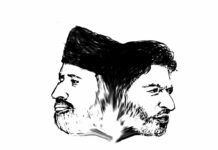Mehraj Din

Resistance acts as a lynchpin in understanding the struggle of human existence and liberating it from its radicalized “parochial political connotations” will help us to contextualize and trans—historicize its role in civilizational discourses. Resistance actually helps us to remember the histories of occupation and the multifaceted operationalization of oppression on its subjects across territorial boundaries. Brutal murders, targeted killings of kids, rapes of women, and enforced disappearances, crafting apolitical intellectuals in universities are the socio-psychological and intellectual tools used to suppress the voice of dissent. Oppression can bring two possible scenarios into fore: One is the “silencing of dissent” which is actually the sole agenda behind the heinous and gruesome inhumane tortures perpetrated by occupational apparatus and second possible outcome is the “radicalization in the conviction of dissent”.
There is a remarkable story by Kafka, In the Penal Colony, about a crazed official who shows off a fantastically detailed torture machine whose purpose is to write all over the body of the victim, using a complex apparatus of needles to inscribe the captive’s body with minute letters that ultimately causes the prisoner to bleed to death. It is not about inflicting or resisting the brutal face of occupation but reminding yourself the reason of existential question?
Paradoxically, these tortures whether in Palestine or Kashmir, Chechnya or Afghanistan, Syria or Iraq, Cuba or Kosovo couldn’t break the will of a conscious anti-imperial and anti-colonial subject who knows that this fight is against the curtailed and mutilated universal right to freedom. The French Résistance involved men and women representing a broad range of ages, social classes, occupations, religions and political affiliations. In 1942, one resistance leader claimed that the movement received support from four groups: the “lower middle” and “middle classes”, university professors and students, the entire working class, and a large majority of the peasants.
Looking through the prism of history and revolutionary movements, the fact remains evident that whether the imperialist agenda of western powers manifest in the mass murders of Afghans, Iraqis, Syrians, Palestinians and Kashmir or inhumane tortures in Guantanamo’s and Papa 2’s of Kashmir. Every society is supposed to show a “continuous commitment” in resisting the empire—the symbol of colonialism—identified in history sometimes as a monarchy, Sultanate, kingship, communism, Hindutva or liberal democracy—the Uncle Sams of modern history.
What we should realize is the contextualization and channelization of all the individual pursuits whether it is (political activism, resistance poetry, civil disobedience, writings, photojournalism, documentary and film making) must evolve a “political consciousness” which will afterwards lead to the culmination of a conscious manifestation of dissent.
Remembrance is one of the key rules in resistance struggles and “revisiting the atrocities” will help us not only to continue our struggle but understand the differentiation between the home and the house Negros — the dark-horses of occupation. The brutalization/intensification of occupation adds a new “memory” within its subjects—and actually gives you a reason to resist, nourish “memories” against the occupational structure, and helps us to identify our “enemy”. Identifying your “enemy” creates a self-evolving mechanism that even if your occupier builds the walls all the way to the sky still you will find a way to fly above them. Even if the occupier tries to pin you down with a hundred thousand arms, but you will find a way to resist. And there are many like of you/me/us out there, more than you think. People who refuse to stop believing. People who refuse to come to earth. People who love to live in a world without walls, people who love into hate, into refusal, against hope, and without fear. As Martin Luther King Jr said, “We must learn that passively to accept an unjust system is to cooperate with that system, and thereby to become a participant in its evil.”
(Mehraj Din is research scholar in the University of Kashmir.)
















Absolutely Right as Prophet Muhammad (saw) also said, ” Stop evil with your hand .If not atleast by your tongue and even if not that then least is hating it in your heart and that is the lowest level of iman (faith)”. Being silent spectators of the persecutions and slavery makes us one of them.